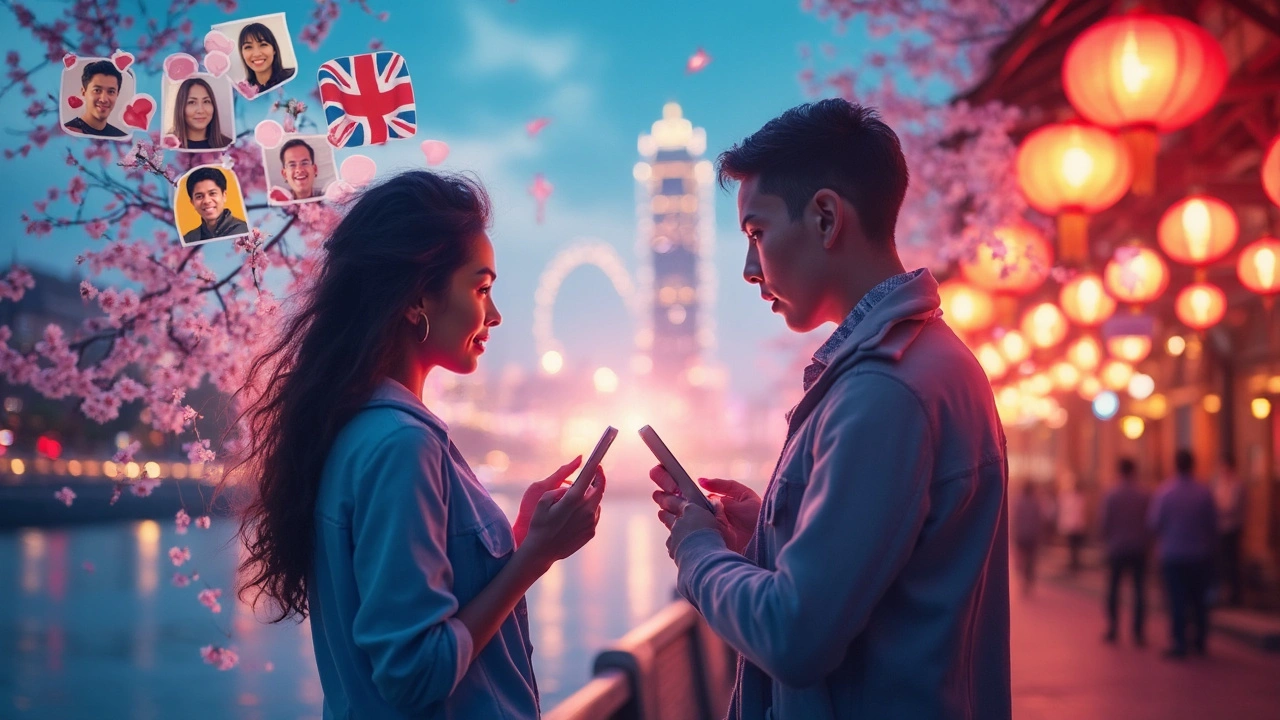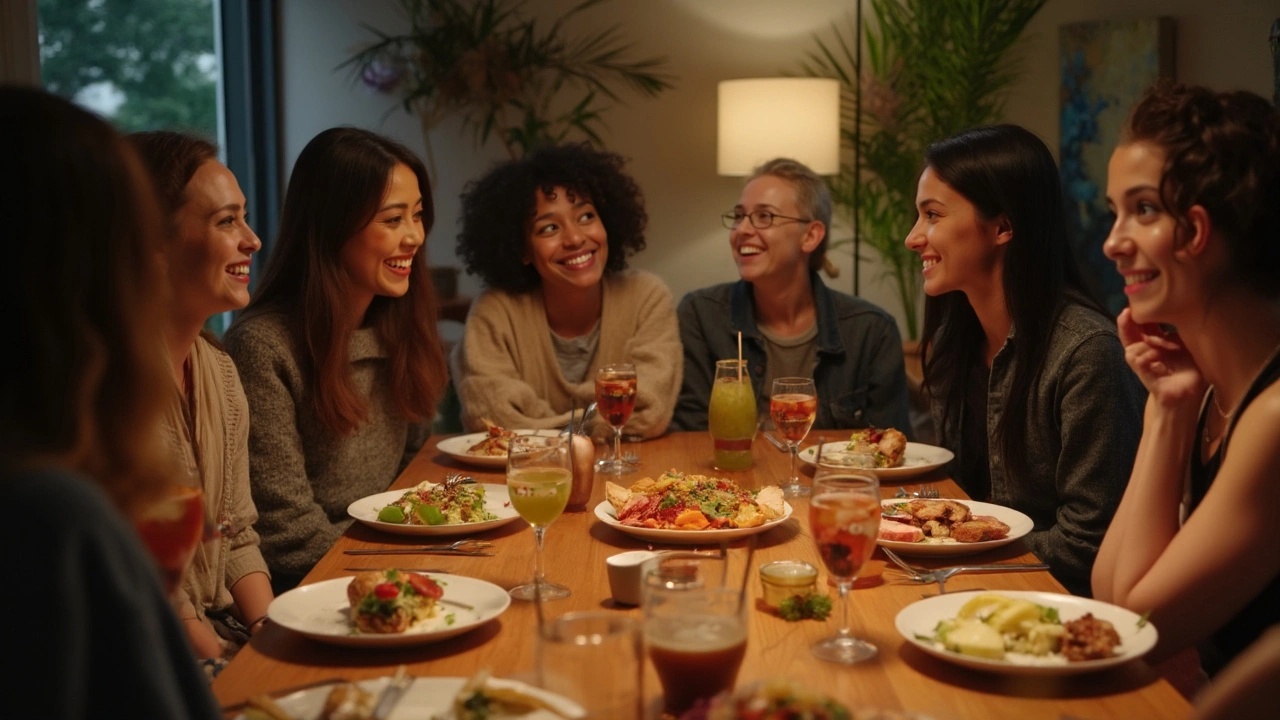Asian Dating Tips and Insights: Navigating Cross-Cultural Relationships Online

Think dating is complicated? Try adding a splash of culture from across the world. Asian dating isn’t just about finding someone who checks your boxes—it’s about learning to navigate dozens of traditions, expectations, and sometimes, language hurdles. If you've ever swiped right on someone living in Tokyo while sitting in London, you know the excitement (and awkwardness) that can come with cross-cultural romance. The world’s gone global, and with so many people turning to online dating, Asian dating is more popular—and more accessible—than ever. But that also means more chances to mess up, misunderstand, or miss out.
Understanding the Cultural Landscape of Asian Dating
Some folks think Asia is one big monolith when it comes to dating culture, but it’s a wildly diverse region. Just peek at a map. From the modern hustle of Seoul to the slower pace in rural Vietnam, dating looks completely different country to country—and even city to city. Take Japan, for example: group dates called 'goukon' are way more common than one-on-ones (you meet your crush in the presence of friends, which takes some pressure off). Meanwhile, in China, matchmaking corners fill parks in big cities, where parents swap handwritten résumés of their kids, looking for a perfect match. That would be totally weird in most Western countries, right?
There’s a reason tradition runs strong in many Asian countries. Family is front and center. In a 2024 survey by Statista, over 68% of respondents in India cited parental approval as a top concern in choosing a long-term partner. Compare that to just 15% in the UK. So, when someone shares how important their family is, they’re not just being polite—they mean it. Try to embrace, or at least respect, this value if you’re serious about dating Asian singles, especially if it could get serious.
Religion and social habits also shape the landscape. Buddhism, Islam, Hinduism, Christianity—they all influence dating rules, from how affectionate you can be in public to when or if you introduce someone to your family. There’s no universal playbook; a date in Singapore might grab bubble tea at a bustling mall, while a first date in Malaysia could lean more traditional, maybe even chaperoned. If you’re feeling lost, ask friendly and open-ended questions about what’s comfortable or expected. Curiosity beats assumptions every time. Don’t just rely on pop culture—those K-dramas and Bollywood movies can be way off from real life.
Online Dating: How Technology is Changing the Game
So, you want to meet someone, but you’re not about to hop on a plane to Bangkok just to say hi? Online dating has blown the doors off geographic barriers. Apps like Tinder, Tantan, Coffee Meets Bagel, and even old-school sites like EastMeetEast make connecting with Asian singles as easy as scrolling through Instagram. In 2023, App Annie noted that dating app downloads jumped by over 20% in Southeast Asia compared to 2021. Lots of people are meeting spouses through these platforms—it's not just for hookups.
One big draw? Dating apps let you filter by location, language, interests, and (for some) even religion or willingness to relocate. Want a Korean foodie, a Japanese manga fan, or a Mandarin speaker who shares your Netflix addiction? Just a few taps stand between you and a perfectly tailored shortlist. And because many Asian users still value tradition, you’ll find lots of folks looking for real commitment rather than short-term flings.
But before you fire off that message, it pays to know digital etiquette. Spamming "Hey, beautiful" to anyone who looks remotely like your type doesn’t fly. Take some time to read their profile—comment on something specific. Did they post a photo at Mount Fuji? Ask about their favorite hiking spots. Got a pic holding bubble tea? Joke about how you never get the toppings ratio right. Showing genuine interest beats empty compliments every single time. Keep it real and friendly; cheesy pickup lines are a quick ticket to the blocked list.
Here’s a quick look at the most-used dating apps and their popularity by country, just so you have an idea where to start:
| Country | Most Popular Dating Apps | Notable Fact |
|---|---|---|
| Japan | Pairs, Tinder, Omiai | The majority of users prefer apps over meeting at bars |
| South Korea | DangYeonSi, Amanda, Tinder | ID verification is common for safety |
| China | Tantan, Momo, Baihe | Some apps have strict government oversight |
| India | Tinder, TrulyMadly, Shaadi.com | Matrimonial sites remain hugely popular |

Common Missteps and Stereotypes—And How to Avoid Them
Let’s call out the elephant in the room: stereotypes run rampant in the world of Asian dating. Whether it’s the "shy Asian girl" or "stoic Asian guy" myth, it’s not just lazy thinking—it actually wrecks your chances at a real connection. Put bluntly, no one wants to feel like your exotic fantasy. You're dating a complex person, not a checklist of clichés. Repeatedly, friends and people I’ve met at expat parties say the same thing: being treated with curiosity and respect, rather than as someone’s bucket-list item, makes all the difference.
No one wants to read a first message that leads with, “I’ve always wanted to date an Asian person.” It happens more than you’d think, and it instantly signals that you’re there for the wrong reasons. Focus on personality, shared values, or hobbies. Avoid comments about appearance or outdated assumptions around gender roles. In a recent YouGov poll, 43% of respondents listed “being seen as a stereotype” as a top frustration, right above “ghosting.”
Language barriers crop up, too. A Google Translate message isn’t the end of the world, but try not to rely only on translation apps. If you’re serious about someone, pick up a few words in their language—it shows effort. Even something simple like thank you (“arigato” in Japanese, “xièxiè” in Mandarin, “terima kasih” in Bahasa)—can bring a smile. Nobody expects fluency overnight, but genuine effort beats Google Translate every time.
And don’t assume everyone’s aiming for marriage. In big cities like Shanghai or Hanoi, plenty of singles are happy to date casually, just like anywhere else. Always communicate your intentions clearly; it saves both sides from disappointment later.
Tackling Distance, Time Zones, and Reality Checks
Long-distance dating has its own set of struggles, but add a half-day time gap and you’re in for some creative scheduling. It’s not uncommon to see couples video chatting at midnight (for one) and lunchtime (for the other) just to catch each other awake. If you’re both busy, things can slip—sometimes it feels like you’re living in two separate worlds. The good news is, technology shrinks the distance. Video calls, voice messages, and instant photo sharing help you stay close, even when cities (or continents) keep you apart.
Packed schedules call for planning. Try setting up regular video dates and be honest about what works for both of you. Want to stream a movie together? Use apps like Teleparty to sync things up. Even cooking similar dishes or sharing playlists can bring a little common ground. But beware of burnout—sometimes one partner ends up stretched thin trying to match time zones, especially if one of you lives in North America and the other in Asia’s east. If it starts to feel like a chore, talk it out and tweak your routines.
Eventually, you’ll hit the question: will we meet in real life? If you’re thinking of traveling, check visa requirements well in advance—some Asian countries have strict visiting rules, especially if you say it’s to meet a romantic partner. Costs add up quickly, and travel delays (think: 2020’s global chaos) can throw you off. But for plenty of couples, the payoff is worth it. In a 2023 Pew Research survey, about 30% of transnational couples who met online were in-person within a year. Of those couples, two-thirds said it helped solidify their relationship.
Want to keep things balanced while living far apart? Here’s what’s worked for real couples:
- Plan regular video dates and stick to a schedule so nobody feels left out.
- Surprise each other with little digital gifts, like playlists or food delivery (if you know their address—don’t be creepy).
- Build trust slowly—don’t overshare your whole life before you know each other well.
- Make it clear what you’re hoping for, whether marriage, moving someday, or just a fun romance.
- Stay patient. If things get tough, remind each other why you started.

Getting Real: Lasting Relationships and Honest Communication
Every successful relationship—no matter where in the world—comes back to the basics: honesty, patience, and listening skills. Cross-cultural relationships just swing that door wide open. You’ll face questions you’d never think of if you dated someone from down the street. “Are we bringing up kids bilingual?” “What holidays do you celebrate?” “Is it cool to bring friends home at midnight, or is that taboo?”
Good communication is everything. If you feel confused or slighted, talk it out instead of letting things stew. Directness is valued in some Asian cultures, like Hong Kong’s business scene, but too much bluntness might seem rude elsewhere, like in Thailand or Japan. The trick is blending honesty with respect. Sometimes you’ll stumble. Maybe you mess up a holiday gesture or forget an important family meeting. Apologize and show you’re willing to learn. Most people love seeing effort—it’s the intention that counts.
It’s also wise to check your own expectations. Some folks fall for the idea of the “mystery” of Asian culture but aren’t ready for the everyday grind—like helping a partner study for exams, handling their work stress, or just eating weird snacks they swear are delicious (you haven’t lived until you’ve tried durian). If you’re open-minded and up for adventure, you’ll find joy in the little things.
Long-term, shared life goals matter more than cultural similarities or differences. Deciding whether to move, whose language will be spoken at home, where family fits in—these talks make or break couples. Take your time. Nobody gets it perfect. Over 50% of respondents to a 2024 InterNations survey said flexibility and a willingness to compromise helped their international relationships stay strong for the long run.
Dating across cultures isn’t just for the bold or the world travelers. It’s for anyone who’s curious, ready to grow, and eager to find something genuine—no matter where it comes from. If you’re open and up for the challenge, Asian dating can actually deepen your understanding of the world and what matters in love. So, strike up that chat, make your move, and see what happens. Sometimes, the best connections come from the most unexpected places. If you remember anything, it’s this: respect beats assumptions every time, and honesty is the secret sauce in any relationship.

